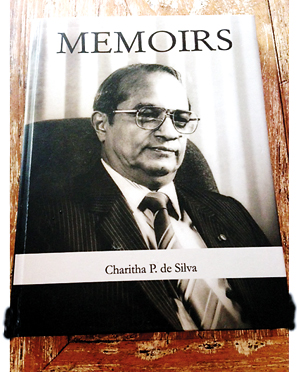Of life and mercantile lore of the recent past
View(s):It is appropriate that, on the eve of his 90th birthday, Chari de Silva decided to share the story of his life and times with his family, friends and other readers.
Chari’s early years make fascinating reading. His father was a medical doctor and their ‘gama’ was Panadura – a legendary cradle of civil servants, scholars, lawyers, doctors and Buddhist leaders. Interestingly, Mangala his mother, who gave birth to seven children, was a keen chess player to her dying day. All his brothers excelled in their studies and went on to become an academic, an administrator, an archaeologist, a doctor and a giant in the corporate world. Chess and bridge were their familiar pastimes. Chari writes of them with affection, candour and amusement.
He goes on to give an almost rapturous account of his schooldays at Royal with an enviable mix of schoolboy escapades and brilliance in studies while excelling and winning prizes and awards in chess and table tennis.
Here I must deviate to speak of Chari’s fleeting romance with a lovely (naturally) girl. To me, as a student of Ludowyk, the significance of this ‘brief encounter ’ are the poems these young lovers exchanged. I quote some memorable lines from Chari and his love when it all ended. Her farewell poem echoes Thomas Hardy’s memorable “You did not come and marching time drew on….”
 “I remember, I remember the evening long ago
“I remember, I remember the evening long ago
The hour was late, the pendulum moved, slowly to and fro
You told me, Oh so kindly, you told me then in vain,
You cannot form attachments without incurring pain”
Chari’s response was equally poetic -
“Let’s cut our losses at the crest
Of fortune . We took our chance, and had the best
Of fortune. Now our parting’s nigh
A farewell kiss, a fleeting sigh For what is past, and then….. Goodbye”
What amazes me is the lyrical quality, verbal dexterity and emotional depth of the poetry of these teenage students in the Science Stream – of Royal and Visakha. I find it sad that the demands of study doused the flame of poetry in Chari and his lost love. I am sure readers will understand why I have spent so much space on these lovely verses.
Chari’s University career was, naturally, brilliant - excelling in his studies and, incredibly, he won trice the University Table Tennis title, won colours in tennis, and became a chess champion. Here he fell in love with the great love of his life, Susheela. When the Sinhala Buddhist Chari married the Tamil Christian Susheela in church he broke the hearts of his father and mother. But Chari honourably agreed to “convert” to Christianity at his bride’s insistence. He writes with deep emotion of Susheela as a loving wife and mother. As time went on, he quietly graduated towards atheism. No spiritual solace did he seek even during her long drawn-out fatal illness. What I admire in Chari’s Memoirs is that he never feels any need to attribute other-worldly influences over his life and career.
Chari’s outstanding career in the private sector, where he reached the very summit, occupies most space in his Memoirs. His rise to head, and advance Aitken Spence is legendary in mercantile circles. His sterling honesty and decision not to enrich himself at company expense, enabled him to overcome the machinations of less than honest colleagues. He pioneered the leasing industry in Sri Lanka in association with a Japanese multinational. His achievement in this field and contribution to Japan-Sri Lanka commercial links won him the high Japanese Imperial Honour of the Order of the Rising Sun, Gold & Silver Star.
Chari’s opinions on private sector issues were often sought by government, though not always accepted. His official contacts with Presidents Premadasa and Chandrika Kumaratunga make interesting reading. Premadasa was immune to advice, thoroughly prejudiced and always suspicious. So much so, that Chari, advisably, had to take steps for his personal safety – given the long reach of Premadasa’s minions. Chandrika was different. She sought advice, which she appreciated and, occasionally, accepted.
The final section ‘Vignettes’ displays the vast variety of Chari’s interests. These Letters to the Editor and talks he delivered range from advice on Emotional Intelligence and Good Governance to Kasippu Mudalalis, Sigiriya (beloved of his archaeologist brother Raja), advice on Chairmanship, Buddhist Culture,Yahapalanaya and much, much more – always written in a clear, straightforward style. Although written, primarily, for his family Chari’s Memoirs is an enthralling account of life and mercantile lore in Sri Lanka of the recent past.
Chari’s has been a life of scrupulous honesty and integrity. His Memoirs are a must for readers in the private sector as well as those embarking on such a career.
| Book facts | |
| Memoirs by Charitha P. de Silva. Reviewed by Tissa Devendra |


